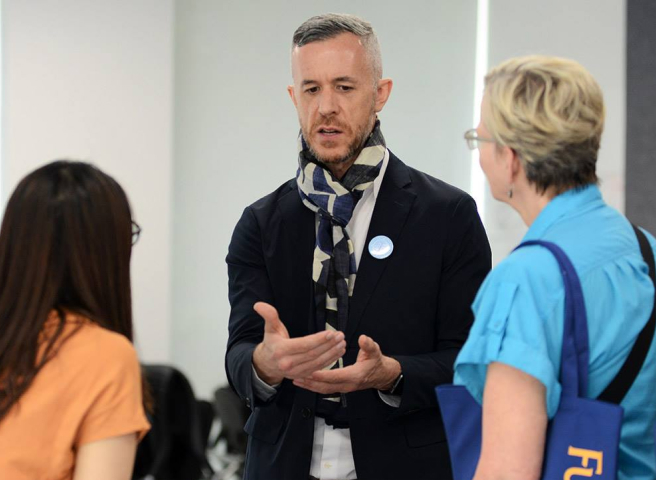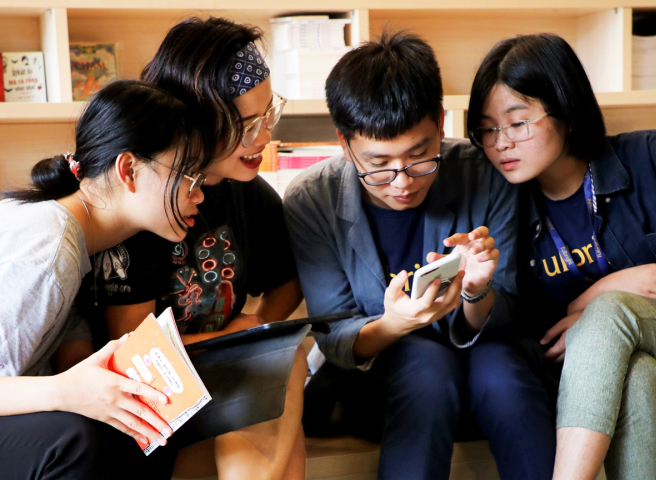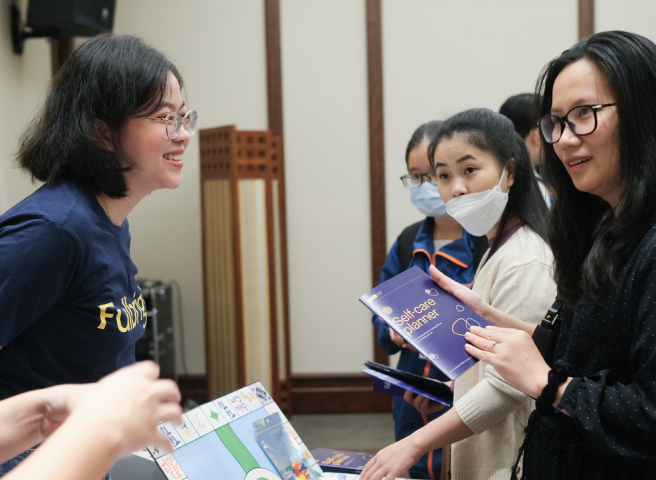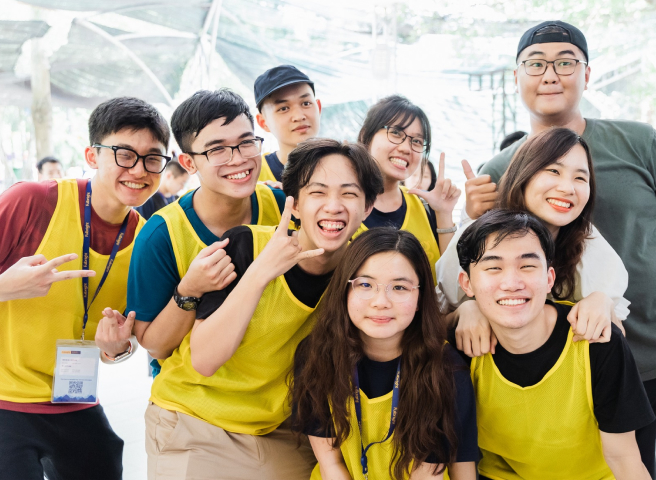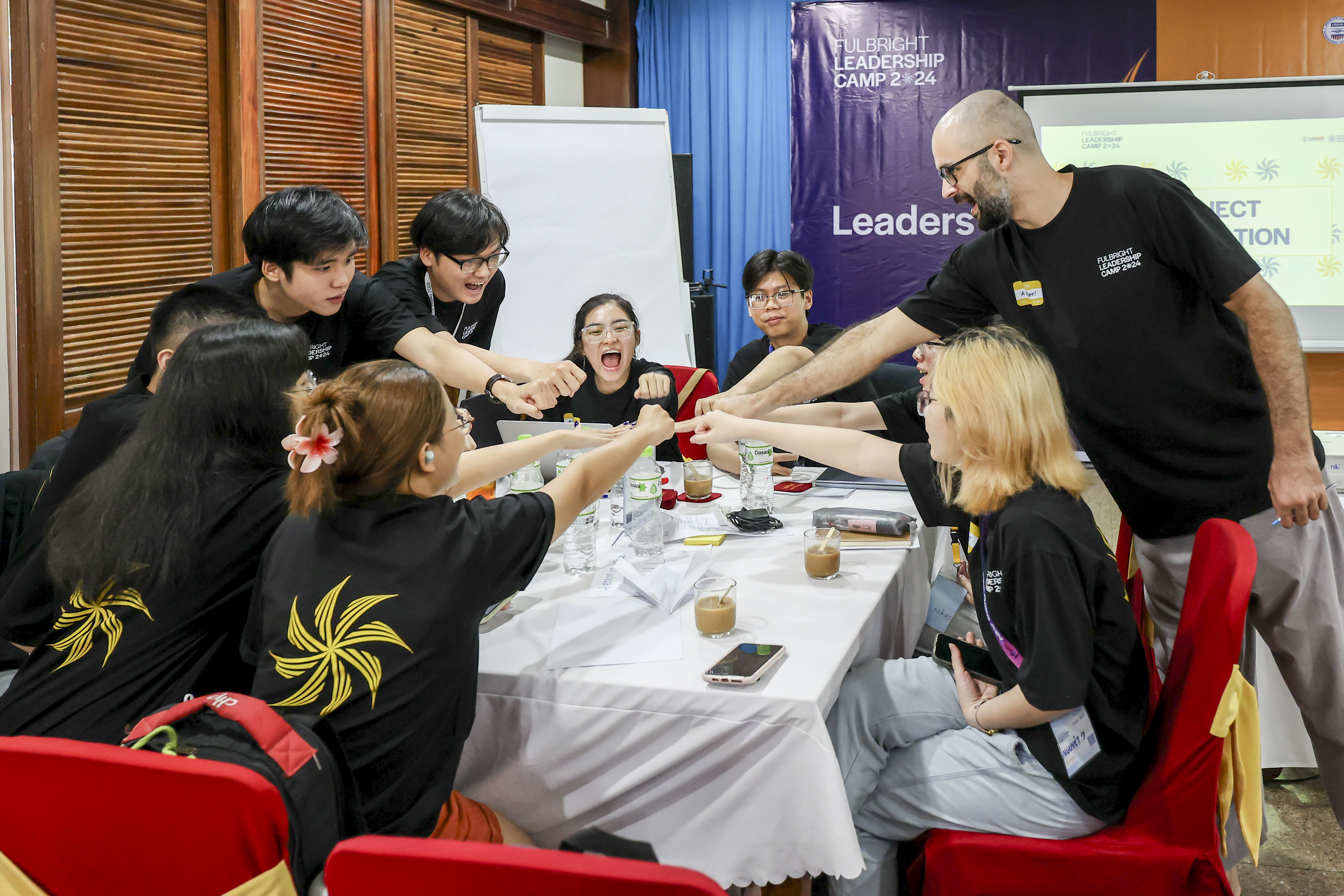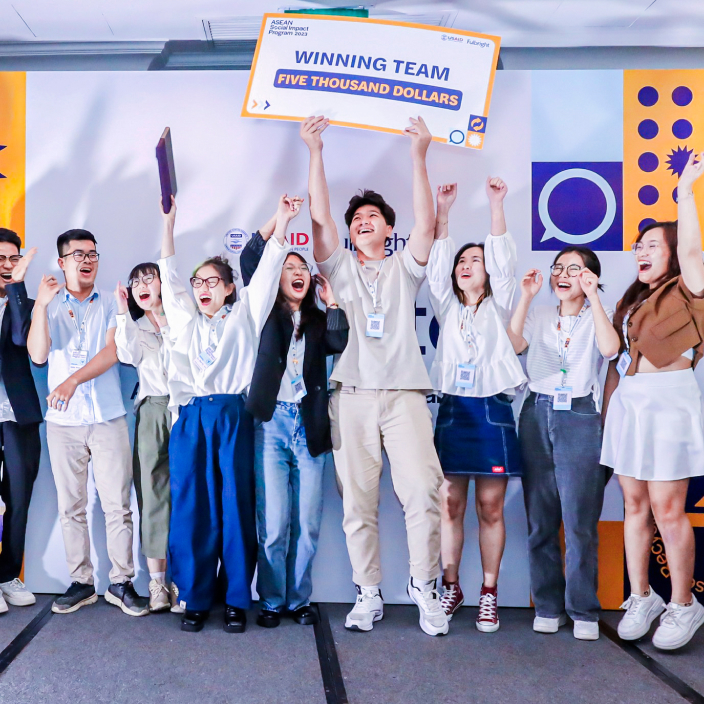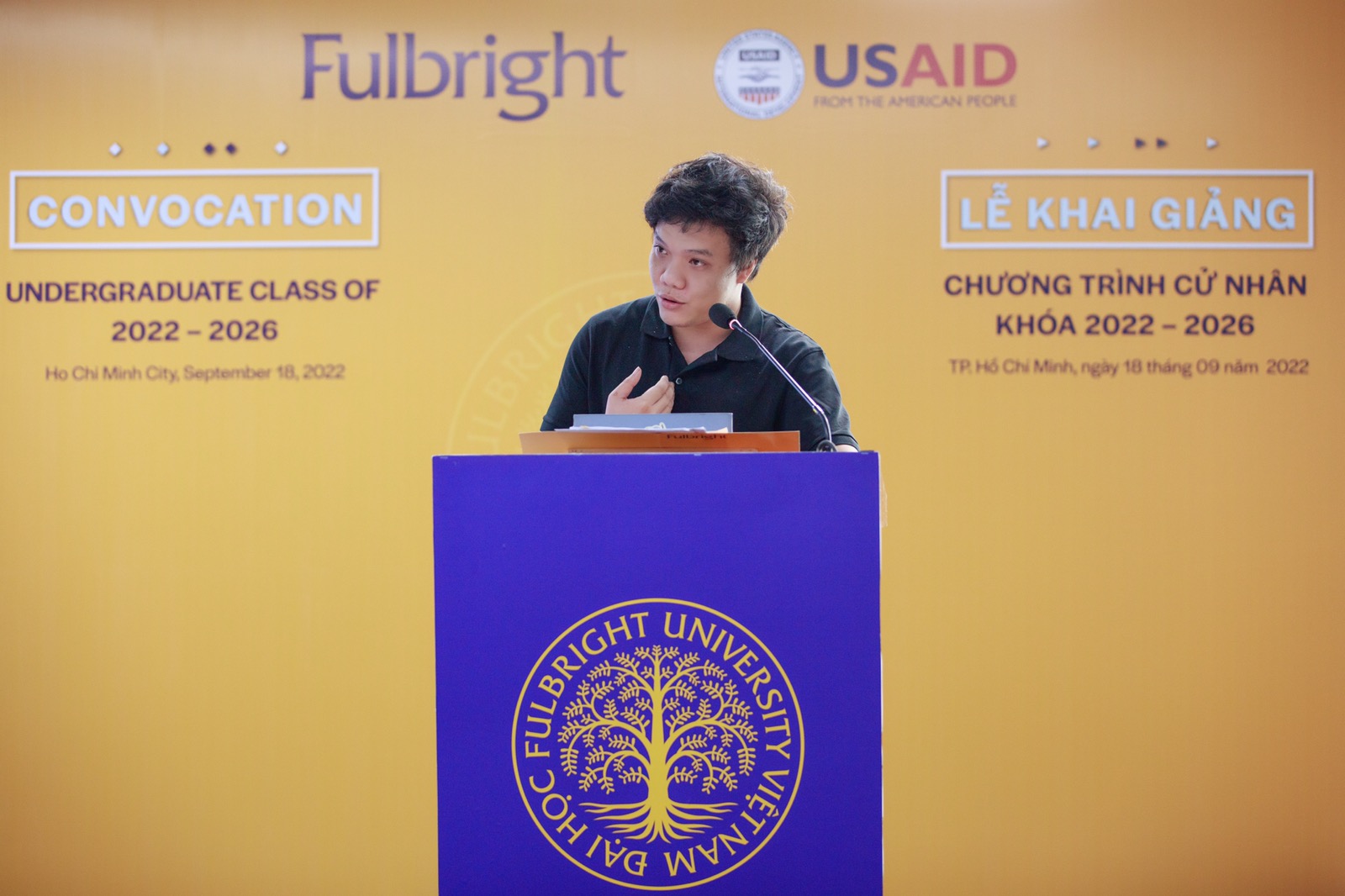
Trong lá thư mời của chủ tịch Đại học Fulbright Đàm Bích Thủy gửi cho tôi để dự lễ khai giảng năm nay, chủ đề được nêu ra là: Phá vỡ những khuôn mẫu và kiến tạo thế giới theo cách của bạn.
Tôi thật sự rất bối rối. Tôi không biết phải nói gì với các bạn. Có một nghịch lý ở đây, là chính tôi cũng là người bài xích chủ nghĩa kinh nghiệm. Nếu mục tiêu là phá vỡ khuôn mẫu, thì sao phải nghe lời người đi trước? Ai lại đi truyền dạy kinh nghiệm về việc thoát ra khỏi những kinh nghiệm? Để phá vỡ những khuôn mẫu, điều đầu tiên các bạn cần làm, là nghi ngờ chúng tôi, những người đi trước, chứ không phải nghe theo.
Chính tôi đã sống như vậy – đã biết đặt câu hỏi và nghi ngờ mọi thứ kinh nghiệm mà người đi trước ra sức truyền dạy – bây giờ tôi lại bảo các bạn nghe tôi đi, điều hay lẽ phải đây nè, quá là dở hơi.
Nghịch lý này tồn tại ở khắp nơi. Giống như ngay cả chủ nghĩa tự do đến cuối cũng là một hệ thống nguyên tắc ngặt nghèo, mà thỉnh thoảng, trong lịch sử người ta nhân danh chủ nghĩa tự do để áp đặt người khác bằng vũ lực. Ai lại đi áp đặt người khác phải tự do, lại còn bằng vũ lực? Kiểu tự dưng xông vào đấm người ta sưng cả mắt, ai cho phép mày nghĩ thế, mày phải suy nghĩ tự do lên.
Tôi nghĩ khá lâu, và tự hỏi rằng điều gì là quan trọng nhất mình học được trong đời, để nói trong lễ khai giảng này.
Tôi xin phép được giới thiệu với các bạn một khái niệm bằng tiếng Đức, “Bildungsphilister”. Đọc là bi-đung-phi-lis-tà. Nó là một khái niệm do Fedredrich Nietzsche đề xuất. Nghĩa của nó, là “trọc phú kiến thức”.
Năm 19 tuổi, tôi đọc khá nhiều triết học. Hồi đó chúng tôi không được may mắn như các bạn, Internet còn khá đắt đỏ. Năm thứ nhất đại học, tôi đi làm thuê cho một công ty truyền thông, và thường ngủ lại ban đêm ở công ty luôn, vì ở đó có điều hòa, có mì ăn liền và có máy tính vào được Internet. Ở phòng trọ không có cả 3 thứ đó, đặc biệt là mì ăn liền. Trong những đêm trắng ở văn phòng, tôi ăn mì xong thì đọc Tư bản luận của Marx, đọc Kinh Tăng chi bộ của Thích ca, đọc Đạo đức học của Kant và Zahasthustra đã nói như thế của Nietzsche và tất nhiên là chẳng hiểu gì cả. Tôi nghĩ mình đang muốn trở thành một người giỏi giang thì phải đọc, đọc thì phải đọc mấy ông nổi tiếng và các tác giả kinh điển. Nhưng có những ông như Kant thì một chữ một trang cũng không hiểu.
Nhưng cuối cùng, trong những ngày tháng đó, tôi may mắn học được một quan điểm từ Nietszche, đấy chính là việc đọc nhiều sẽ chỉ khiến các bạn trở thành một loại trọc phú kiến thức, chứ không kiến bạn thành người giỏi hơn.
Trọc phú kiến thức là cách mô tả dành cho những người đọc rất nhiều, báo chí, sách vở, ghi nhớ những kiến thức trong đó và tin rằng chúng là của mình. Bạn sẽ gặp những người như vậy ở rất nhiều nơi. Đặc biệt là trong xã hội Việt Nam hiện nay, khi mà Internet và mở cửa đến ngang xương, đổ ập vào đầu người ta một mớ tri thức và ai cũng có quyền tin rằng tri thức này thuộc về mình.
Các fanpage chuyên tầm chương trích cú; các bạn hotgirl khoe vòng eo con kiến kèm những câu chiêm nghiệm về cuộc đời; các diễn giả cả đời không có công trình thực tiễn, toàn nói lại sách vở phương Tây; các nhà báo, các học giả lệ thuộc vào việc phải trích lời danh nhân nào đó… Và nó không chỉ diễn ra trong lĩnh vực khoa học. Nếu các bạn follow đủ số lượng các fanpage và instagram, các bạn sẽ nhận được một rừng những tri thức về cuộc đời, về tình người, về cách sống – được dẫn lại từ đâu đó. Chúng ta đang sống trong một thời đại của copy and paste.
Bạn, ngày mai, có thể trở thành người như thế. Đọc được cái này sướng quá, và nghĩ là mình thế là hiểu biết hơn người khác rồi. Ngày mai xưng xưng đi hỏi bạn bè, mày có biết vì sao thị trường nhà đất Hoa Kỳ và Phố Wall sụp đổ năm 2008 không, tao vừa xem hết một bộ phim của Michael Moore. Deep lắm, để tao giải thích cho. Trọc phú kiến thức sẽ nói chuyện kiểu đấy.
Tôi và nhiều thầy ở đây sẽ nói rằng kể cả bạn có xem hết Michael Moore, Adam McKay và đọc hết cả Noam Chomsky, bạn chưa biết chuyện gì đã xảy ra ở Mỹ đâu. Phải cho đến lúc bạn thực sự nhìn hệ thống ngân hàng và thị trường BĐS Việt Nam vận hành – ở Việt Nam, và năm 2022 này – bạn mới hiểu chuyện gì đã diễn ra ở Mỹ năm 2008. Đó thường là cách mà tri thức tự thân hình thành.
Việc đọc, ghi nhớ, và nói lại những tri thức đã được viết thành sách vở không sai. Nhưng nó không bao giờ đúng. Bởi vì tri thức thực sự chỉ hình thành thông qua quá trình chiêm nghiệm, trải nghiệm, hấp thụ, tự phản biện, tự luận. Nếu Noam Chomsky đã nói ra câu gì đó, dù nó không chê vào đâu được, nó cũng sẽ chỉ trở thành tri thức của bạn, nếu bạn thực sự quan sát, chiêm nghiệm với những điều đang diễn ra trong thế giới của mình. Nếu nó không tự hình thành bên trong, bạn cũng chỉ là kẻ nói nhại người khác.
Đó là ý nôm na của Nietszche khi đề xuất khái niệm “trọc phú kiến thức”. Tôi may mắn nhớ được điều này vào năm 19 tuổi, để tránh trở thành một người như thế.
Phải tránh trở thành một người như vậy, vì sống như một trọc phú kiến thức rất sang trọng. Nói ra những điều mình đã đọc, đã xem, đã nhớ thì có gì mà sai? Đứa khác không đọc thì nó ngu nó thiệt, chứ tôi chăm chỉ đọc sách báo, xem phim tài liệu trên Netflix, tôi có quyền được nói lại những điều trong đó. Đó là tri thức của tôi.
Các thầy cô ở đây sẽ nói với các bạn rằng có những điều nghe rất đơn giản, thậm chí sáo mòn, nhưng cho đến khi người thực sự trải qua và chiêm nghiệm, họ mới nhận ra rằng đó là tri thức của mình.
Để tôi kể cho các bạn một câu chuyện vui. Ở trên tôi nói rằng những tháng năm thanh niên tôi đọc kinh Tăng chi bộ của Thích Ca. Trong Tăng chi bộ, có mấy điều mà Phật dạy các Tì kheo, trong đó có một điều mà năm đấy tôi tâm đắc lắm.
Câu đấy là: “Tâm tư thế giới, thời không thể nghĩ đến được, nếu nghĩ đến người nghĩ có thể đi đến cuồng loạn và thống khổ.”
Câu này để diễn nôm lại thì ngày đấy tôi cũng làm được. Đại loại, chúng ta, thế giới của chúng ta, những điều đang diễn ra xung quanh chúng ta là vô minh, không nên cố gắng đi tìm bản chất của chúng. Nếu cố hiểu được tâm tư thế giới, chỉ có phát điên.
Chuẩn rồi. Tâm đắc lắm. Hay. Các bạn nhớ câu này nhé.
Bây giờ đến câu chuyện. Có một giai đoạn, tôi quen hai cô gái, và không thể quyết định được rằng mình sẽ yêu ai. Cũng không phải là lừa, vì tôi có nói với một trong hai cô rằng cô kia là người yêu của tôi. Cái cô tạm gọi là “thứ 3” này cũng đang có người yêu. Cảm mến nhau thì hay gặp gỡ, đi chơi, tụ tập cùng bạn bè chung. Nhưng rồi tình cảm với cô bạn này cứ leo thang, và đến một lúc cả hai bạn gái đều không thể chịu đựng được nữa, họ quyết định gặp nhau nói chuyện cho ra nhẽ.
Tôi cũng không biết cuộc gặp diễn ra như thế nào. Nhưng đi về thì tôi gặp bạn không chính thức trước. Bạn ấy bảo mình đừng gặp nhau nữa, Hoàng về đi.
Các bạn biết lúc đấy tôi nói cái gì không? Tôi là trọc phú kiến thức mà, tôi ngoài 20 tuổi và đang thức đêm đọc sách triết học, và tôi tin rằng các cô ấy yêu tôi một phần vì tâm hồn trọc phú này. Tôi nói với cô ấy: “Tâm tư thế giới, thời không thể nghĩ đến được, nếu nghĩ đến thì người nghĩ chỉ đi đến cuồng loạn và thống khổ”. Tôi trích Phật Thích Ca để giải quyết vấn đề ái tình luôn. Thề.
Cô ấy bảo tớ chẳng hiểu gì cả, bạn về đi.
Chuyện sau này cũng bung bét vì tôi cũng chẳng quay lại với bạn người yêu chính thức được.
15 năm trôi qua. Bỗng nhiên một ngày chúng tôi gặp lại. Chỉ còn tình cảm của những người bạn cũ. Chúng tôi nói chuyện về cuộc sống, và tất nhiên, cả những điều không nên cố bận lòng trong cuộc sống. Rồi bỗng nhiên, tôi nhận ra rằng cả hai chúng tôi đến lúc đấy mới hiểu câu nói năm xưa. Đúng là tâm tư thế giới, thời không thể nghĩ đến được, nếu nghĩ đến người nghĩ có thể đi đến cuồng loạn và thống khổ. Chính tôi lúc đấy mới hiểu. Và cô ấy đến lúc ấy mới hiểu. Chúng tôi đã ở tuổi trung niên.
Ngay cả mấy câu quote về tình yêu hay lẽ sống, chúng ta cũng thỉnh thoảng phải mất một lúc, thường là 15 đến 20 năm, mới thực sự nhận ra nó nói cái gì.
Tri thức về ái tình rất quan trọng, nhưng dù sao đây cũng là lễ khai giảng của một trường đại học. Hãy nói về vai trò của tri thức nghề nghiệp. Với tôi thì bi kịch lớn nhất của một nhân sự, dù ở bất kỳ lĩnh vực nào, là phải vay mượn tri thức.
Tôi có nhiều bạn bè là trọc phú kiến thức. Họ có vị trí xã hội, tiền kiếm cũng không khó quá. Nó đến từ một đặc trưng của xã hội Việt Nam là cơ hội tiếp cận tri thức chưa được chia đều. Thời của các bạn thì đều hơn một chút, nhưng ở nhiều vùng sâu vùng xa, người ta cũng chưa có Netflix để xem, không có sóng 4G và một cái hiệu sách cũng không có. Thời của tôi thì khoảng cách này còn xa hơn. Tôi may mắn xin được việc làm thêm và xem Internet chùa, chứ ở những năm 2000, hầu hết bạn học của tôi chỉ có đi ngủ sớm (thức đêm thì mì cũng không có mà ăn).
Khoảng cách này cho phép một số người được đọc nhiều hơn người khác, tiếng Anh tốt hơn, kỹ năng tìm kiếm Google tốt hơn – và họ ra sức sử dụng lợi thế đó để tranh vị trí xã hội. Khoảng hai mươi năm trước, thậm chí thị trường xuất bản bị thống trị bởi các nội dung dịch thuật, phái sinh từ báo nước ngoài. Người dân không tự tìm kiếm được thông tin mà – và hình thành một đội ngũ nhà báo, chuyên gia chỉ việc nói lại những gì đọc được trên Internet là kiếm được tiền. Thậm chí nhiều tiền. Trong buổi phỏng vấn xin việc đầu tiên của tôi cách đây 16 năm, câu hỏi duy nhất tôi còn nhớ, là em hay đọc thông tin ở trang nào. Hồi đó biết đọc ở đâu là cả một loại trình độ. Lại còn đọc bằng tiếng Anh thì quá đỉnh. Đến bây giờ những trọc phú kiến thức này vẫn còn chỗ đứng trong xã hội.
Nhưng ngược lại, tôi cũng có những người bạn cả đời chỉ viết ra những thứ nguyên bản – những thứ anh ta thực sự suy nghĩ, chiêm nghiệm được, nhặt nhạnh được, những thứ tự hiểu ra. Họ sẽ kiếm tiền chậm hơn, vì không thể sản xuất công nghiệp được. Có khi cả đời họ có một tác phẩm được biết đến thôi. Rút ruột ra thì khó hơn là đi vay mượn mà.
Cuộc đời tôi chỉ kính nể loại người thứ 2 – những người làm ra các thứ bằng tri thức nguyên bản. Loại thứ nhất dù họ có bước xuống từ một cái Mẹc S, hay là trích được Emmanuel Kant bằng tiếng Đức, tôi vẫn thấy xót xa cho đời họ. Một cảm giác thương hại chân thành.
Bạn hẳn đã nhận ra rằng trong loại người thứ hai này, những người có tri thức tự thân, ngoài các bác sĩ, các nhạc sĩ, các nhà nghiên cứu, còn có cả bác sửa xe, bác nông dân, chị bán ốc. Họ thực sự trở thành chuyên gia trong lĩnh vực của mình nhờ vào khả năng quan sát và tự chiêm nghiệm.
Hãy tưởng tượng ra hai khung cảnh: một là việc ngồi xổm ở hàng sửa xe, và nhìn bác sửa xe gỡ tung chiếc Kawasaki của bạn ra, sờ mó, thăm khám nó và chẩn đoán bệnh, tìm nguyên nhân có âm thanh lọc cọc trong máy. Thứ hai là việc ngồi trong một khóa học được giảng bởi một vị có học vị tiến sĩ, nhưng bạn biết rằng slide trên bảng một trăm phần trăm là tài liệu nước ngoài, ông này chỉ Việt hóa ra xong nói lại sang sảng thôi. Hãy nghĩ về hai hình ảnh đó. Bạn sẽ hiểu cảm giác của tôi khi nói rằng tôi kính nể loại người này, và thương hại loại người kia.
Tại sao chúng ta cần tri thức nguyên bản nếu tri thức vay mượn vẫn kiếm ra tiền, nhanh hơn và đỡ vất vả hơn? Với tôi có hai lý do, một là sự bền vững của tri thức tự thân. Hai, là di sản bạn mong muốn để lại.
Tri thức vay mượn không bền vững, ngay cả trong việc kiếm tiền. Nếu anh chỉ nói lại điều người ta đã nói, nó sẽ trở nên lạc hậu rất nhanh. Tôi đã kể ở trên rằng thời mới mở cửa, việc kiếm tiền từ các nội dung vay mượn thống trị ngành xuất bản. Nhưng rồi tới thời của các bạn, những người có thể đọc tiếng Anh vanh vách và nắm bắt thông tin từ các nền tảng tự do như reddit chứ còn chả thèm đọc báo. Những chuyên gia này bỗng nhiên thất nghiệp. Bạn sẽ không thể tưởng tượng nổi là năm 21 tuổi, nếu điều chỉnh theo tỷ lệ lạm phát, tôi kiếm tương đương với khoảng 70 triệu mỗi tháng ngày nay, chỉ bằng việc đọc và dịch báo nước ngoài. Bạn không tưởng tượng được, vì bây giờ có ai cần cái nghiệp vụ đấy đâu? Bây giờ mà chỉ biết đọc báo bằng tiếng Anh thì coi như là không có kỹ năng gì.
Ngay lúc này, tôi cũng đang chứng kiến sự thất thế của rất nhiều chuyên gia vay mượn, các trọc phú kiến thức, các chúa tể Google này.
Những kiến trúc sư nói như vẹt về “phong cách Scandinavia”, minimalism hay “phong cách Indochine” vì người ta nói thế, chứ không hiểu được các nguyên tắc nền tảng của mỗi nền văn hóa. Họ vẫn kiếm được tiền ở vài địa phương, nhưng sẽ dần mất thị phần ở những nơi mà chất lượng sống đang tăng lên.
Những tác giả sao chép các motif từ các kịch bản Hollywood và Hàn Quốc, đặt nó vào bối cảnh Việt Nam, mà không hiểu được tình cảm và thân phận con người. Họ sẽ bị mất thị phần vào chính tay các tác giả nước ngoài – những người dành cả đời tìm hiểu một chủ đề.
Những chuyên gia truyền thông nói về các mô hình phương Tây, trích dẫn Philip Kotler hay David Ogilvy mà không hiểu được tâm lý của người Á Đông hay Việt Nam. Họ sẽ mất thị phần vào chính tay bác sửa xe tự học tôi nói ở trên: nếu bác ấy quyết định mở một chuỗi cửa tiệm, thì đó sẽ là người hiểu hơn ai hết về cách người Việt Nam đối xử và kỳ vọng ở cái xe của mình. Bác ấy sẽ hiểu Philip Kotler hơn cả những ông đọc Philip Kotler bằng tiếng Anh, và có thể tự lên một chiến lược marketing đỉnh của đỉnh.
Chúng ta đang không nói về việc ngày mai ra trường kiếm được việc làm. Chúng ta đang nói về một sự nghiệp 30-40 năm. Google không duy trì được sự nghiệp kiểu này.
Sự nghiệp của bạn chỉ bền vững nếu mỗi điều bạn nói ra đều là điều bạn tự nhận ra. Nó bền vững theo cách này: khi bạn tin vào những điều mình nói và mình làm, khi nó là một phần tâm hồn, là suy nghĩ của bạn, thì kiếm được nhiều tiền hay ít tiền không quyết định giá trị của sự nghiệp nữa. Sự nghiệp lúc này gắn với cái tôi cá nhân của bạn, treo lủng lẳng ở tim bạn, chứ không gắn với thang đo tiền bạc. Siêu bền vững.
Và hãy tin lời tôi, rằng xã hội ngày càng tôn trọng các tri thức nguyên bản. Nó sẽ thưởng xứng đáng cho bạn.
Lý do thứ hai bạn cần có tri thức tự thân, chính là di sản bạn muốn để lại. Nó cũng là chủ đề của lễ khai giảng năm nay, kiến tạo thế giới theo cách của bạn. Di sản không phải là thứ gì to tát kiểu một cái tượng đài đâu, mà là bất kỳ điều gì tốt đẹp bạn để lại thế giới này. Thế giới nó chỉ cần tốt lên một chút khi bạn rời đi, so với khi bạn bước vào, là bạn đã để lại di sản rồi.
Thế làm thế nào để có được tri thức nguyên bản? Bạn vẫn phải đọc. Đọc rất nhiều. Bạn vẫn ghi nhớ. Nhưng không phải để phun ra, để sống như một trọc phú, khoe mẽ với đám trí nhớ đó. Bạn cứ nhớ trong đầu thôi, và cuộc sống sẽ cho bạn thêm các mảnh ghép để tri thức tự hình thành. Bạn không cho phép mình nói ra một thứ gì, ứng dụng một kiến thức gì, nếu chưa tự tin rằng đó là điều bạn tự nhận ra.
Copy and paste không sai. Nó chỉ sai khi bạn không thực sự hiểu những gì mình paste. Tôi chỉ nhận ra cái gì gọi là “trọc phú kiến thức” cho đến khoảng chục năm sau khi bắt đầu ghi nhớ nó trong đầu.
Đó là một hành trình đau đớn, so với việc lên wikipedia và pinterest để tìm cái gì cóp xuống cho xong deadline. Nhưng các thầy cô ở đây sẽ nói với các bạn, là tri thức, rất thường xuyên, hình thành thông qua mất mát, đau đớn và cả ân hận.
Hành trình theo đuổi tri thức tự thân là một hành trình bất công nữa. Bạn có lúc đó giật mình nhận ra rằng bọn sao chép vay mượn đang kiếm tiền nhanh hơn mình và có vẻ sung sướng hơn mình. Bạn sẽ tự hỏi rằng nhưng mục đích của em đi học là có công việc tốt và kiếm được tiền; việc gìn giữ cái tôi, việc kiến tạo thế giới theo cách của mình có thực sự quan trọng đến thế không.
Tôi sẽ nói, gì nhỉ. Bạn hiểu được bao nhiêu và tin vào điều gì là tùy bạn.
Bởi vì tâm tư thế giới, thời không thể nghĩ đến được, nếu nghĩ đến, người nghĩ có thể đi đến cuồng loạn và thống khổ.
Cảm ơn các bạn.
Đinh Đức Hoàng,
Tác giả, Nhà báo
